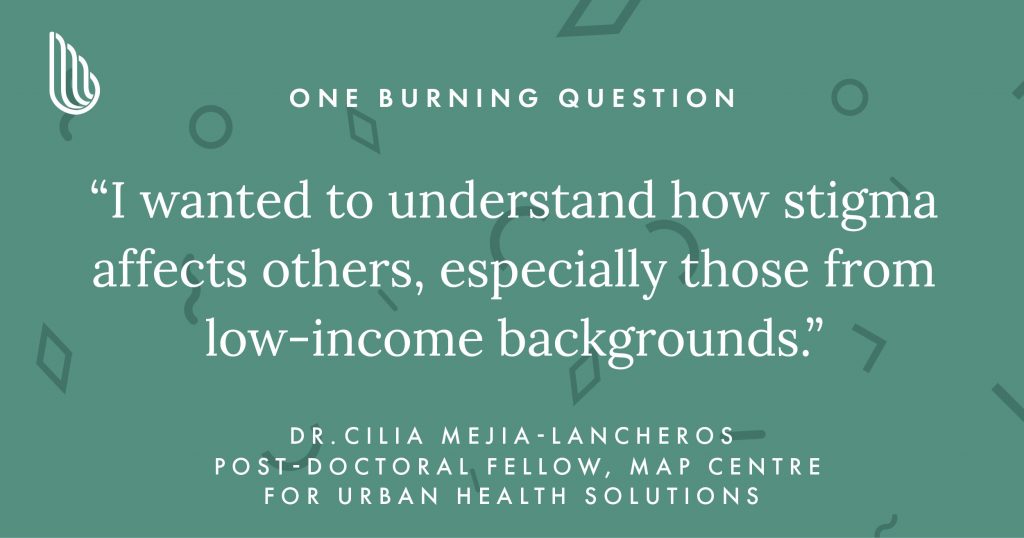Dr. Cilia Mejia-Lancheros’ #OneBurningQuestion: How does mental-health related stigma affect homeless people?

January 29, 2021
By Maria Sarrouh
Dr. Cilia Mejia-Lancheros grew up in rural Colombia, on a homestead farm located in the Santander region of the Cordillera Oriental branch of the Andes. Her family grew coffee, fruits and vegetables and raised livestock. The country’s internal political conflicts heightened socioeconomic inequities for people living outside of big cities, and as a child, Dr. Mejia-Lancheros didn’t have the same access to high-quality education, health-care and social services as children in wealthier areas.
“My background exposed me to being stereotyped as ‘poor’ by those in high-income positions and I was an unwelcome migrant in other countries due to the association of Colombia’s internal struggle with the illegal drug trade,” said Dr. Mejia-Lancheros, a Postdoctoral Fellow at the MAP Centre for Urban Health Solutions. “These factors jeopardized my opportunities to thrive as person, woman and scientist, but also motivated me not to give up on my personal and professional goals.”
Dr. Mejia-Lancheros has devoted her career to better understanding how socioeconomic determinants of health – such as safe housing, quality of education, social interactions, access to job-related opportunities and health care services — affect various population groups.
She recently led a study published in the Journal of Social Science and Medicine, which highlights the complex relationships between mental-health related stigma, housing stability and well-being.
“I have been stereotyped over the course of my career and my life,” said Dr. Mejia-Lancheros. “I wanted to understand how stigma and discrimination can affect others, especially those who are minorities or come from low-income backgrounds.”
The discovery
Dr. Cilia Mejia-Lancheros found that stigma and discrimination are linked with the recovery and well-being of people with recent experiences of homelessness and mental illness.
Even after achieving housing stability, some participants in the study faced discrimination as they interacted with neighbours, potential employers and service providers. Ongoing stigma limited their ability to secure employment, socialize comfortably with their communities and access necessary health services.
For this reason, the Housing First program — although very effective in helping people find housing and connect with social and health services — doesn’t offer a complete solution. People with recent experiences of homelessness continued to face factors such as poverty and complex metal health issues that increased the likelihood of evictions and negatively affected their quality of life.
For example, many participants said they experienced discrimination when they tried to access social support or mental health services, which diminished their ability to recover and exacerbated substance abuse, according to Dr. Mejia-Lancheros.
“Homeless people – whether they struggle with mental illness or not – are labelled as being violent, dangerous, drunks, or taking part in illegal or criminal activities,” she said. “Due to these labels, they are treated unfairly even within social and health-care systems.”
Additionally, securing a stable source of income is more difficult for people with recent experiences of homelessness because they are stereotyped as being stagnant and unmotivated by potential employers. Consequently, this leads to further discrimination from their community.
“They are stereotyped as lazy, or that they don’t want to work,” Dr. Mejia-Lancheros said. “They’re made to feel guilty by their housing estates and for their poor economic conditions.”
The bigger picture
In order to end homelessness in Canada, multisector interventions are needed to mitigate the widespread discrimination and stigma that exists among health-care, service and housing providers.
“We need to implement policies that combine safe, affordable housing with specialized mental health care and employment or skill development programs,” said Dr. Mejia-Lancheros. “This kind of research can inform interventions to help Canadian people exit homelessness.”
Dr. Mejia-Lancheros hopes studies like this one will lead politicians to address the issue of housing affordability for low-income groups, minorities and people who experience mental or physical health concerns. However, on an individual level, she said we can all be more conscious about the ways we support or exclude this population group.
“Together, we can join forces to help people who experience health problems and housing instability have a better life,” she said.
